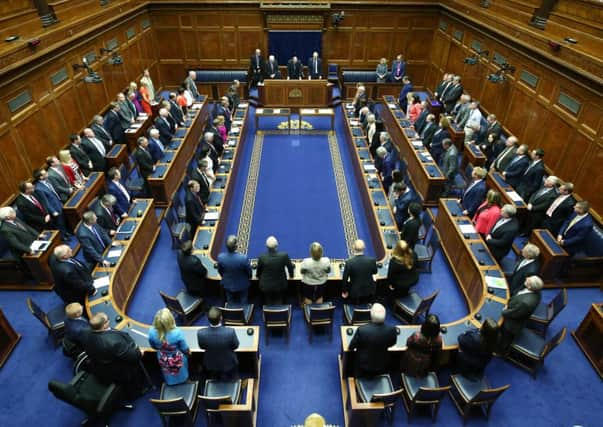After vocal complaint, Stormont's tiny parties could get more say


The copy of a paper – ‘Alternative approaches to give the Speaker more flexibility to provide speaking opportunities for smaller parties’ – discussed by MLAs behind closed doors yesterday afternoon has been seen by the News Letter.
The five-page document, which could see additional speaking time for the Green Party, People Before Profit and TUV, was debated on Tuesday by members of the Assembly’s business committee, the body of MLAs which decides on what should be debated in the chamber.
Advertisement
Hide AdAdvertisement
Hide AdAccording to the paper, the SDLP’s Colin McGrath last month asked that the committee “revisits the decision it made on May 31 in relation to speaking rights”.
Last week the dispute, which has been raised behind the scenes over recent weeks by the smaller parties, boiled over into the Assembly chamber where the Greens and TUV claimed that they were being kept from being able to speak on many issues because of what TUV leader Jim Allister claimed was a “closed shop” run by the bigger parties.
Mr Allister said it was an “inequity” that the smaller parties were denied a place on the business committee and said that although there had been around 500 motions debated in the chamber during his five years as an MLA, “never once have I been permitted the privilege of proposing a motion”.
The first option before the business committee would see the Speaker given complete discretion to call whoever he wants to call during debate on private members’ motions.
Advertisement
Hide AdAdvertisement
Hide AdHowever, the paper argues that such a system “offers little transparency and would probably be difficult to administrate”.
The second option is to have a speaking list which adheres rigidly to party size. However, that would see the DUP and Sinn Fein – the government parties – receive 14 of the first 20 speaking slots during debates, leaving limited room for scrutiny by opposition parties.
However, the two big parties have 12 of the first 20 speaking slots under the current rules, leaving the author of the paper to warn that such a move could be seen as a “retrograde step”.
A more novel proposal in the paper would see every party get an opportunity to speak at least once before other MLAs from that party come in – but to allocate the time for each speech based on the size of the party.
Advertisement
Hide AdAdvertisement
Hide AdAnother proposal would see the Speaker given the power to extend the time of a debate in which many MLAs speak, thus allowing smaller parties greater opportunity to contribute.
The final proposal, however, would see Mr Allister lose out as it would only allow parties with two or more MLAs to be called in the third round of speakers, keeping the North Antrim MLA almost at the very end of the queue.